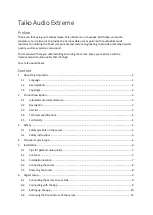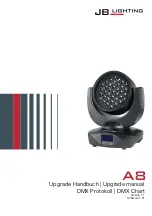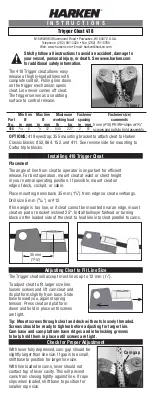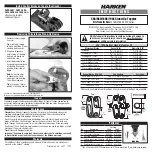
Page 25
submaximal exercise tests and that person’s heart rate response to a fixed
workload is found to decrease over time, it is reasonably safe to conclude that
the individual has made improvements in aerobic (cardiorespiratory) fitness,
irrespective of the accuracy of the VO
2 max
prediction.
Pretest Screening
Prior to any exercise test (maximal or submaximal), participants should
complete a brief health/medical questionnaire, have their resting blood
pressure and heart rate measured, and provide an informed consent form.
The Physical Activity Readiness Questionnaire (PAR-Q) is an example of a valid
health/medical questionnaire for screening individuals prior to submaximal
exercise testing. Canadian health and fitness practitioners have extensively
(and quite successfully) used the PAR-Q to determine whether individuals
should be given an exercise test. A “yes” answer to any of the following seven
questions taken from the PAR-Q would disqualify a participant from taking part
in an exercise test until appropriate medical clearance was obtained.
PHYSICAL ACTIVITY READINESS QUESTIONNAIRE (PAR-Q)
1.
Has your doctor ever said you have a heart condition and recom-
mended only medically supervised physical activity?
2.
Do you have chest pain brought on by physical activity?
3.
Have you developed chest pain within the past month?
4.
Do you tend to lose consciousness or fall over as a result of dizziness?
5.
Do you have a bone or joint problem that could be aggravated by the
proposed physical activity?
6.
Has a doctor ever recommended medication for your blood pressure
or a heart condition?
7.
Are you aware, through your own experience or a doctor’s advice, of
any other physical reason against your exercising without medical
supervision?
The StairMaster Submaximal Fit Test
The StairMaster branching protocol is a series of 3-minute stages of
continuous exercise at increasing intensity. The first stage is a warmup at
approximately 4 METs. The intensity of the remaining stages is based on the
heart rate response to the warmup. The test is designed to raise the steady-
CROSSROBICS 1650 LE CONSOLE
Summary of Contents for Crossrobics 1650 LE
Page 1: ...CROSSROBICS 1650 LE OWNER S MANUAL...
Page 82: ...Page 73 Figure 7 Parts Needing Periodic Lubrication FIGURES...
Page 83: ...Page 73 Figure 7 Parts Needing Periodic Lubrication FIGURES...
Page 84: ...Page 74 Figure 8 Left Side View FIGURES...
Page 85: ...Page 75 Figure 9 Right Side View FIGURES...
Page 86: ...Page 76 Figure 10 Reduction Belt Tension FIGURES...
Page 87: ...Page 77 Figure 11 Handle Assembly Top View with Seat and Seat Tray Removed FIGURES...
Page 88: ...Page 78 Figure 12 Console Assembly FIGURES...
Page 89: ...Page 79 Figure 13 Cover Fastener Location FIGURES...
Page 90: ...Page 80 Figure 14 Cover Fasteners FIGURES...
Page 91: ...Page 81 Figure 15 Top View of the Cover Seams FIGURES...
Page 92: ...Page 82 Figure 16 Weight Stack Belt Assembly FIGURES...
Page 93: ...Page 83 Figure 17 Weight Stack Belt Path FIGURES...
Page 94: ...Page 84 Figure 18 Guide Rod Assembly FIGURES...
Page 95: ...Page 85 Figure 19 Weight Stack Assembly FIGURES...
Page 96: ...Page 86 Figure 20 Pedal Arm Spring Assembly FIGURES...
Page 97: ...Page 87 Figure 21 Master Link FIGURES...
Page 98: ...Page 88 Figure 22 Drive Chain Assembly FIGURES...
Page 99: ...Page 89 Figure 23 Drive Shaft Assembly FIGURES...
Page 100: ...Page 90 Figure 24 Lower Reduction Shaft Assembly FIGURES...
Page 101: ...Page 91 Figure 25 Pivot Assembly FIGURES...
Page 102: ...Page 92 Figure 26 Floating Pulley Assembly FIGURES...
Page 103: ...Page 93 Figure 27 Upper Spring Stop Assembly FIGURES...
Page 104: ...Page 94 Figure 28 Chain Tensioning Idler Sprocket Assembly FIGURES...
Page 105: ...Page 95 Figure 29 Left Pedal Arm Assembly FIGURES...
Page 106: ...Page 96 Figure 30 Main Cable Routing Diagram FIGURES...
Page 107: ...Page 97 Figure 31 Alternator and Resistor Mounting FIGURES...
Page 108: ...Page 98 Wiring Diagram 1 Main Cable Assembly Connections WIRING DIAGRAM...
















































